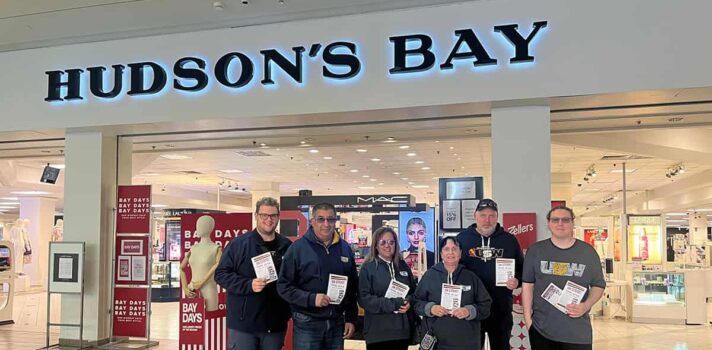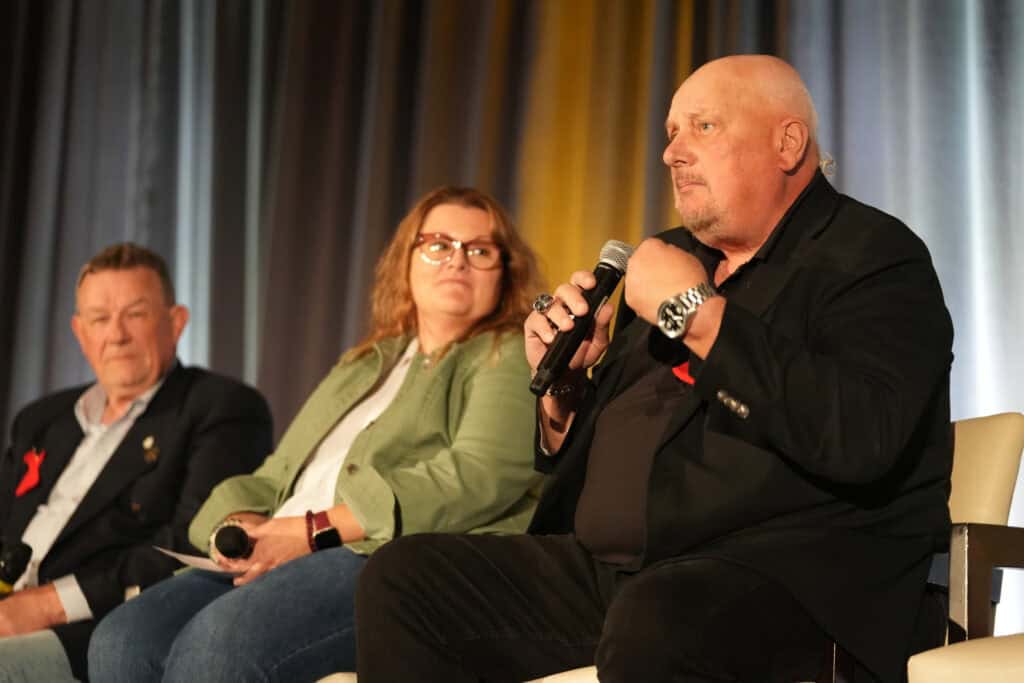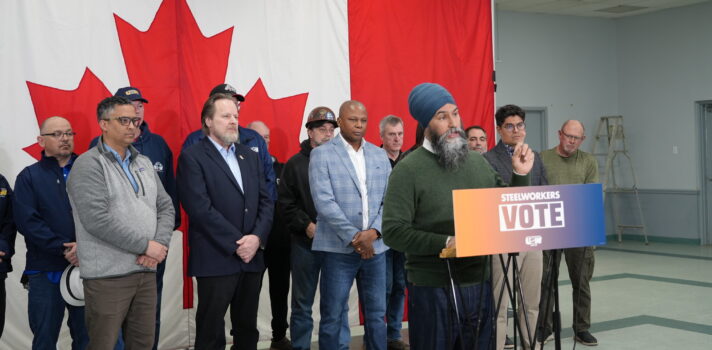The last day of Justice 2024 conference delegates took in presentations and panel discussions on a variety of issues, including the intersections of health and safety, the environment, workplace justice and equity.
In the morning, conference participants heard from District 3 Indigenous Coordinator Julia McKay leading a panel on the National Day of Action on Missing and Murdered Indigenous Women and Girls, joined by Jason Prokopchuk (Local 7689), Jean-Yves Couture, D5 staff representative, and Dan Bertrand (Local 6500).
“It was recognized that in order to break down Indigenous culture, they needed to remove the power from women,” said McKay, speaking about the historical matriarchal structure of many Indigenous cultures and how governments and organized religion sought to destroy Indigenous cultures, communities and families.
There was also a presentation by members of the National Anti-Racism Committee, with a presentation from Education and Equality staff representative Lorei De Los Reyes, Hans-Woosly Balan, District 5 staff representative, Maira Lebron (Local 9400), who spoke about the necessity of taking action against racism and the new human rights committee guide. Local union Human rights committees are mandated by the union’s international constitution.
Kassandra Cordero, Director of Human Rights and Equity at the B.C. Federation of Labour and Local 2009 member spoke eloquently about the urgent need to engage in anti-racism action, breaking it down how go about it. Cordero emphasized that sometimes mistakes happen, even with the best of intentions and the fear of making mistakes needed be a barrier to action. Here is what Cordero suggested to delegates, who may not know how to deal with being called in by Black, Indigenous and racialized co-workers, neighbours and friends. She suggested delegates move past fragility by:
acknowledging harm, validating the person’s experience and feelings, make efforts to mitigate further harm and co-create a solution, if possible.
Legal trailblazer Adelle Blackette, the Canada Research Chair in Transnational Labour Law at McGill University, spoke about the need for meaningful action on employment equity to address historic and going labour market segregation. Blackett chaired the recent federal task force on employment equity, including 12 members from Indigenous nations and Canada’s diverse communities, with both employers and trade union representatives.
Between February to October 2022, the task force held a wide consultation process 109 meetings and engagement sessions with a total of 337 attendees representing 176 stakeholder organizations, partners, and government departments. The USW also participated in the process.
“Legislation doesn’t erase discrimination. We don’t go from a place of exclusion to inclusion overnight,” said Blackett, emphasizing that it is ongoing work to change legislation and cultures to tackle both interpersonal and institutional racism on the job.
Christine Jones from Blue Green Canada spoke about the intersections of human rights and climate change. “We work on connecting the dots between human rights, mental health and climate change. When we connect those dots together, the stronger our society will be, and the better our future will be.”
Next, a panel discussion gave voice to the varying issues facing equity-seeking groups on the health and safety front – from bathroom access equality to member-to-member harassment and violence and risks caused by language barriers to culturally safe and appropriate approaches to mental health. The panel featured Janet Moffat (Local 9042 and member of the Steel Pride working group), Mark Austin (Local 1998 and member of the National Anti-Racism committee), Danya Sykes, Frederic St-Louis (Local 8897) and District 3 Indigenous Engagement coordinator Julia McKay, moderated by Adriane Paavo, department leader for Education and Equality.
Quebec Federation of Labour President Magali Picard delivered an incisive speech, calling out discrimination and racism, including that of the Quebec provincial government which has refused to acknowledge systemic racism. Picard spoke passionately about the origins of her own understanding of discrimination, sexism and racism. Picard is the first ever Indigenous and female Quebec Federation of Labour president.
“What made me the activist I am today is that I am a proud Wendat…It was when I realized at the age of 12 why my Wendat aunts were losing their aboriginal status because they had married non-aboriginals, while my non-aboriginal mother could live in Wendake, that I understood what discrimination was.”
In the afternoon, members of the National Steel Pride working group spoke about their experiences as 2SLGBTQIA+ Steelworkers, how local union leaders can support rainbow community Steelworkers, the need for gender-neutral collective bargaining language and gender-affirming care, as well as the increasingly challenging political climate and the need to be united. The panel featured Dexter Hunlin (Local 6673), Tomy Bezeau-Héroux (Local 9706), Cindy Lee, staff representative for District 3, Brett Barden, Communications and Political Action staff for District 3, moderated by Shannon Devine, Communications and Political Action department leader.
It was followed by an insightful panel on organizing and equity-seeking groups, moderated by USW Organizing Director (US) Maria Somma and featuring a host of talented organizers: Deepak Kullar, organizer in District 3, Pablo Guerra, organizing coordinator for District 3, Casey Burgess, member organizer (Local 343), Amanda Zakhour, Education coordinator for District 6.
“The biggest reward is to be able to tell the members that we won! Seeing their faces is worth it. It is unbelievable,” said Guerra. “Now they are going to have power, they are going to have a voice.”
Julie Hébert, Health, Safety and Environment coordinator for District 5 presented an incredible video account of the district’s impactful and historic on the health and safety front. Check out the video here.
Closing out the conference was a look back at 50 years since the Elliot Lake work stoppage and considering our fundamental health and safety rights. This panel was welcomed by Health, Safety and Environment department leader Sylvia Boyce and moderated by Andy LaDouceur, Health, Safety and Environment coordinator for District 6. The panel featured John Perquin, retired assistant to the International Secretary-Treasurer, Al Bieksa (Local 2009) and Charlene Clarke (Local 13173).
“The local at Elliot Lake knew that something was going on,” said Perquin, explaining the lead up to the work stoppage and the growing outrage in the workplace and community. “Members were dying in numbers far greater than they should have been, by any stretch of the imagination. At three times the rate of the regular population.”
In closing, National Director Marty Warren thanked all delegates for their attendance, their commitment to health and safety and equity and improving our workplaces and communities. A big thanks to conference organizers, AV and hotel staff who also made the conference possible.
Whether it comes to health and safety, homophobia, transphobia, anti-Black, anti-Indigenous or any other form of racism: an injury to one is an injury to all!
Find all workshop resources here.
Share on Facebook




